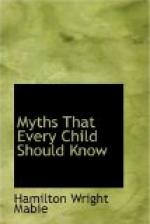PART VI
What Was the End of the Heroes
And now I wish that I could end my story pleasantly; but it is no fault of mine that I cannot. The old songs end it sadly, and I believe that they are right and wise; for though the heroes were purified at Malea, yet sacrifices cannot make bad hearts good, and Jason had taken a wicked wife, and he had to bear his burden to the last.
And first she laid a cunning plot, to punish that poor old Pelias, instead of letting him die in peace.
For she told his daughters: “I can make old things young again; I will show you how easy it is to do.” So she took an old ram and killed him, and put him in a cauldron with magic herbs; and whispered her spells over him, and he leapt out again a young lamb. So that “Medeia’s cauldron” is a proverb still, by which we mean times of war and change, when the world has become old and feeble, and grows young again through bitter pains.
Then she said to Pelias’s daughters: “Do to your father as I did to this ram, and he will grow young and strong again.” But she only told them half the spell; so they failed, while Medeia mocked them; and poor old Pelias died, and his daughters came to misery. But the songs say she cured AEson, Jason’s father, and he became young and strong again.
But Jason could not love her, after all her cruel deeds. So he was ungrateful to her, and wronged her: and she revenged herself on him. And a terrible revenge she took—too terrible to speak of here. But you will hear of it yourselves when you grow up, for it has been sung in noble poetry and music; and whether it be true or not, it stands forever as a warning to us, not to seek for help from evil persons, or to gain good ends by evil means. For if we use an adder even against our enemies, it will turn again and sting us.
But of all the other heroes there is many a brave tale left, which I have no space to tell you, so you must read them for yourselves—of the hunting of the boar in Calydon, which Meleager killed; and of Heracles’s twelve famous labours; and of the seven who fought at Thebes; and of the noble love of Castor and Polydeuces, the twin Dioscouroi; how when one died, the other would not live without him, so they shared their immortality between them; and Zeus changed them into the two twin stars, which never rise both at once.
And what became of Cheiron, the good immortal beast? That, too, is a sad story; for the heroes never saw him more. He was wounded by a poisoned arrow, at Pholoc among the hills, when Heracles opened the fatal wine jar, which Cheiron had warned him not to touch. And the Centaurs smelt the wine, and flocked to it, and fought for it with Heracles; but he killed them all with his poisoned arrows, and Cheiron was left alone. Then Cheiron took up one of the arrows, and dropped it by chance upon his foot; and the poison ran like fire along his veins, and he lay down, and longed to die; and cried: “Through wine I perish, the bane of all my race. Why should I live forever in this agony? Who will take my immortality that I may die?”




